Richie Neal’s extraordinary journey from a working-class neighborhood in Springfield, Massachusetts, to Washington, D.C., and one of the most powerful jobs in American politics as the chairman of the Ways & Means Committee.
On November 7, 1960, Mary Garvey Neal, who had roots in Ventry, County Kerry, took her son to the Springfield, Massachusetts, town hall. It was very late and Richie Neal, then 10 years old, would never forget that evening.
He was there to witness one of the last campaign stops of Senator Jack Kennedy during the final frenetic days of the race against Richard Nixon for the presidency.
Inspired by the passion and fire he witnessed, Richie Neal decided there and then that he wanted to be a politician. It’s incredible to think, as he now sits atop the House Ways and Means Committee in one of the most powerful jobs in American politics, that the influence of Jack Kennedy still lives on.
Neal himself has a wonderful American story. He lost his mother to a heart attack in 1962 when he was just a young boy, and his father, a school custodian, died not long after. He and his sister were orphaned, raised by an aunt and grandmother. He remembers how they gave all the love they had, put him on the right track in life, and practiced good Catholic values.
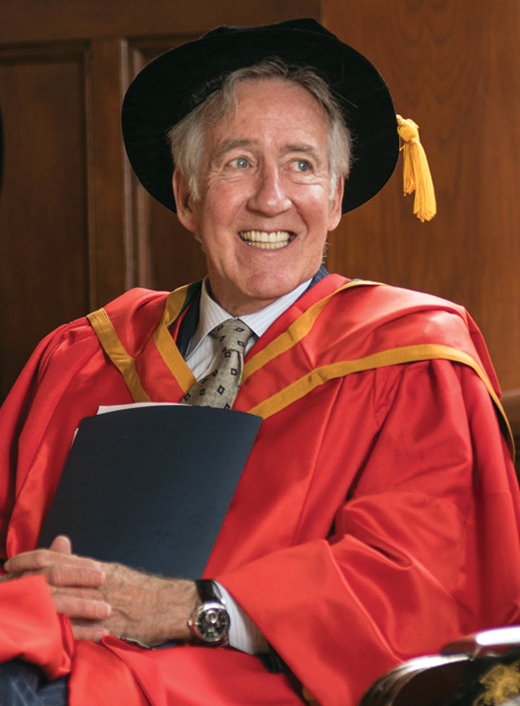
He was following his dream, too. He became councilman in Springfield, then mayor, and then at age 38, took the House seat of Ed Boland, his political mentor, in 1988.
He has held it easily since, often with no opposition, a reflection of his popularity back home.
His path to the leadership of Ways and Means was elongated, but thanks to a combination of retirement and defeat of those ahead of him, he arrived in January 2019 at the head of the most important committee in Congress.
Three future presidents – James Polk, Millard Fillmore, and William McKinley – served as Ways and Means chairmen, while the very first occupant was Thomas Fitzsimons, a native of Ireland who also represented Pennsylvania at the Constitutional Convention in 1787. His portrait, overlooking the committee room, was proudly pointed out by Neal.
Our interview took place in that same august setting of the Ways and Means Committee meeting room, passing through extremely tight security on the way.
As always, Neal was modest and relaxed. He is a worker bee letting others take the limelight – with the exception of one issue: his beloved Ireland and his justifiable pride in the American dimension to the Irish peace process. As head of the Friends of Ireland committee, he is an indispensable friend of Ireland and Irish America.
Of course, there is the little matter of the president’s tax returns, which it falls to Neal to seek. There is no grandstanding or cable news appearances or screaming demands for them, just a heads-down, get-the-facts manner. That is Neal’s way, and it has landed him at the top in American politics, wielding enormous power.
We began by discussing his amazing journey.
℘℘℘
When did politics first beckon?
When I saw Jack Kennedy the day before the election in 1960. He finished in three communities, Waterbury, Connecticut; Springfield, Massachusetts; and Boston, and if you’ve ever seen the film footage of him finishing in Springfield and Boston, as you might expect, he got a hero’s welcome. But seeing him that day – my mother was smart enough to keep us home from school – on the steps of Springfield City Hall, I remember that sense of inspiration and aspiration that I felt, the hope and ambition to do something.
Also, my family would have known Congressman Eddie Boland. My mother in particular always knew someone who was running for the register of deeds or the city council because that was the way up. And it was a great time of ascendancy in politics. There was a succession of mayors, six or seven in a row, whose parents or grandparents were Irish-born. The Democratic party in particular was the beneficiary [of the Irish]; they brought the right infusion of energy. And there was a great alliance between unions and the Democratic party.
From city councilman to one of the most powerful men in America: where did it all go right?
Part of it was ambition. I was thirty-eight when I first got elected to congress. I think I worked at least as hard, if not harder than everybody else. I had a good constituency that I inherited from Eddie Boland. He retired in 1988 and I took his seat.
I think I certainly was patient enough. I kind of made my way up, seat after seat, every two years. And I was lucky that I got a committee early on because the infrastructure in Massachusetts was pretty good. I came through a system where personal loyalty was a very important consideration. You had Joe Moakley [South Boston politician who was chairman of the U.S. House Committee on Rules], Tip O’Neill was just leaving, Eddie Boland had just left and I took his seat and got on a committee very early in my career.
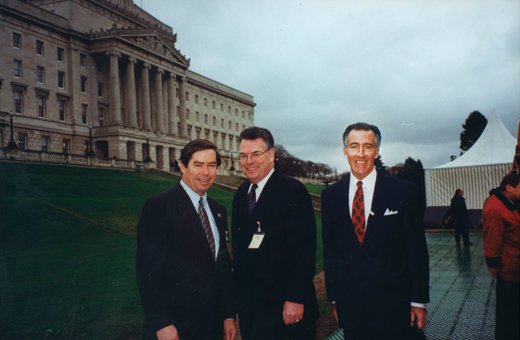
You came from a very humble background, a very tough one, because your mother and father both died when you were young. So how did you cope with that?
I was lucky to have an aunt and a grandmother. They were both great. And I also think it’s interesting that they were very Catholic. So we were never adopted. No social worker ever came to check on us. And the grandmother, she was one of fourteen, so I think her attitude was, “What’s another mouth at the table?” My aunt was devout. Remember those days they used to cover their heads when they went to Mass? We said the rosary at night.
There is much controversy right now as it relates to some of what happened in the Church, but for my aunt, grandmother, and my mother, the Church to them in those days was everything. It was an anchor.
Did you know you were poor?
Not really. It wasn’t exactly as though the neighborhood had a lot. My aunt had a pension, Mass Mutual. We had a little bit of life insurance that my father left, about $10,000. That was it. And we had the genius of Roosevelt’s social security survivor’s benefit. It was about $119 a month for each one of us. It wasn’t a lot, but we lived as a family.
How far back do your Irish roots go?
My paternal grandmother was born in County Down. On my mother’s side, her grandparents were born in West Kerry – Ventry. Irish was the first language for the West Kerry people. Springfield was the next parish over. You went where the others went before you, and they came here. In Holyoke, which is close by, they all came from Mayo. We were all from Kerry. And I think that they were very, very, proud of it. And it wasn’t as though they were going to Irish rallies or anything like that. But they knew of their traditions, they knew who they were and that they came from a pretty ancient culture that was comprised of great achievers. If you asked those people whereabouts they were from, they never said Ireland; they said they were from Kerry.
You first got involved in the North when you were a councilman.
The first time I got involved was in 1981 when Bobby Sands died [on hunger strike]. That’s when I took up a position because people in my community were pretty outraged. You know, those guys were dying on hunger strike, and Margaret Thatcher’s response was that they were criminals.
My first or second speech on the House floor after I got elected was on the use of rubber bullets [in Northern Ireland].
The first time I went to Ireland was around 1983; I went to visit relatives in County Down. In those days it was a militarized state. There were 30,000 British soldiers in an area the size of the state of Connecticut. You couldn’t go from street to street without being monitored. Helicopters circled no matter where you went. I was on a bus with Speaker of the House Tom Foley, and they boarded the bus. They had the big armaments and they had night vision – it was dark when we got on the bus – and they searched it.
When you look back at how the North and the Republic were colonized, and you look at the history, [you’ll see] that until the Rising, it was truly an argument about subjugation.
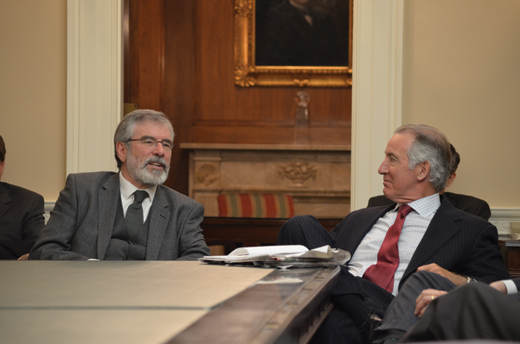
You’ve been very involved in the Friends of Ireland Committee over the years.
Yes. I’m proud of the American role in the Good Friday Agreement. This is our agreement, too. We’re the backstop.
The British Embassy used to come up to the hill to meet with those of us in the [Congressional] Friends of Ireland. These were not pleasant meetings. But when the Good Friday Agreement came about, Tony Blair applauded us right here at the British Embassy. I remembered his quote all these years later. He said, “We’ve been great friends, America and the United Kingdom. We generally agreed on just about everything, but there was one issue we disagreed on: Ireland.” He said, “There was a time when I thought that the Friends of Ireland were a hindrance, but you helped us get through this.”
People forget that the Friends of Ireland was born of the purpose to try to compete with the money that was being used for gun-running. House Speaker Tip O’Neill, who founded it in 1981, said that the idea was just to kind of offer a competing vision. So now you can go and say that the Friends of Ireland position is “No Border.” You can have the Speaker of the House say, “I agree!” I think people have forgotten that.
The Good Friday Agreement was everything, because it was Belfast / Dublin, and institutions would be created that would be All-Ireland institutions.
I saw [the importance of] that after we just left Derry, where that young woman [Lyra McKee] was murdered recently. The idea that an Irish prime minister would go to the funerals…
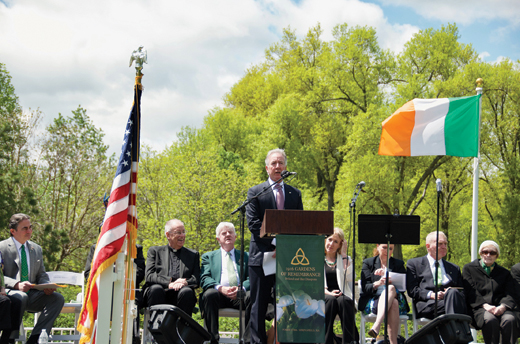
And leaders of the D.U.P.
And sit next to each other. You know, there was a time when the Irish prime ministers didn’t go. The British prime minister didn’t go. And I think that the Good Friday Agreement and the elimination of the border was so important.
Did you visit the border on your recent trip?
Yes. On the trip over, I mentioned to Nancy Pelosi my concern that they would try to talk us into avoiding the border. And she said, “We are going to the border.” And she went, and stood there. She walked across it. And nobody was confused when she was done talking about American foreign policy in relation to Brexit, saying that Congress would block any new trade deal with the U.K. if Britain’s exit from the E.U. threatened the peace in Northern Ireland.
We were advised that if the North goes [leaves the U.K.], then Scotland will go. And our response was, “It’s self-determination.” The Good Friday Agreement says that there could be a referendum question [on a united Ireland], and the greater number will prevail.
At the right moment. In the local elections last week, Unionist parties went from 246 to 202.
You see what’s happening. But this has not been going on for two years. This has been going on for thirty-five to forty years. It’s demographic. Of the six counties, there [are] four now that have a nationalist majority.
The people who have been against Brexit [have] successful agrarian interests in the North. And the reason they are against it is because they like selling their products in the Republic of Ireland. In the heyday of Ulster, or the North, part of the argument that the unionists used was that they had a higher standard of living in the North than the people in the Republic – not true any more. And you look at the resiliency of the Irish economy, from where they were [to] where they are now. How it bounced back. I think that without that border, people in the North look at it and they say, “You know what, if there is a true departure now from the European Union, it’s not bad for us to be Irish citizens.”
Do you think you’ll see a united Ireland?
Yes. Vigorously so. Oh, yes. And I think part of it is that you’re going to be reminded who has been against Brexit.
Are you optimistic about peace talks?
Yes. I think it is going to be born of necessity. If you are on the unionist side, it’s time to make the best deal you can. If you are on the nationalist side, you have to not do to the unionists what was done to you.
Do you still think they need an American envoy?
An honest broker is needed. I think that one of the problems we have had is that we thought there was going to be a successor to George Mitchell. It’s not going to happen. There’s only one Mitchell. Not only that: you look at how strong Blair was at the time. He really put something into it. And Bill Clinton really put something into it. Sometimes you need the strong men and the strong women to make the deal. The Irish government, during those years, was in favor of propping up SDLP. And the British government was in favor of propping up the D.U.P. And when the deal became inevitable, the toughest people made the deal [the nationalists and the loyalists].
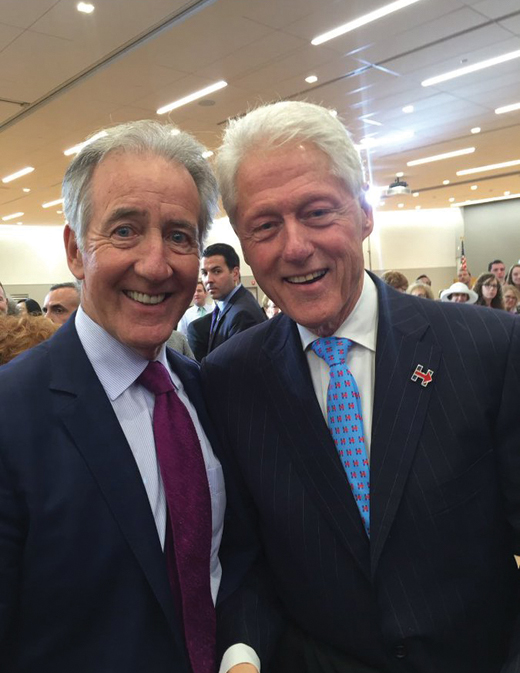
How did you get on with Brexiteer Rees-Mogg?
I am surprised to hear that sort of talk in this day and age. The world has moved on, by decades. He clings to the notion of “empire.” There are those who make this argument for a return to a different time, I mean, if you remember when Roosevelt and Churchill were a great collaboration, World War II, and how America was destined to make the difference. Roosevelt pointed out that this was about advancing democracy, supporting our allies, but not a return to empire. He pointed out that we’re not going back to that.
There’s a group in London, England, who ran in a local election on a no-Brexit platform and won 704 seats. It’s the same in Britain, if the Labor party leader would only realize it, but he won’t take the chance.
When we met Jeremy Corbyn, he seemed to agree with everything we said about Ireland and the border. But whether or not he’s strong enough to do something about it, we’ll have to see.
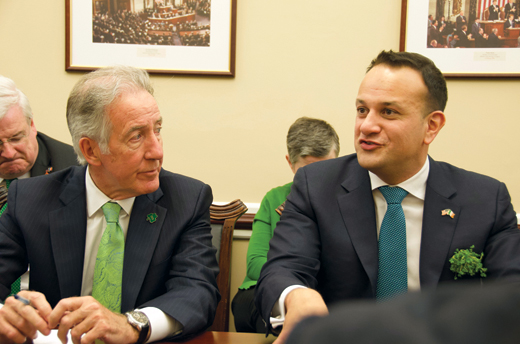
Let me ask you about the current day. What surprised you about the job, now that you have it?
Trying to manage a lot of the personalities is not easy. I always felt very comfortable on the policy stuff; I was smart enough to pay attention over the years. And I like reading long pieces about it, and hearing what everybody has to say, but boy, managing the strong personalities. I think that our job is to educate the public, not to entertain them. I think entertainment has seeped into politics; there’s this kind of, “I got to get out there,” before thinking through what you want to say, and I just resist that.
You’re in the ring with Trump, how are you doing?
The reality is, he won. And I think that we can have plenty of sharp disagreements, but I’m hopeful that even in this incendiary atmosphere, we can find some common ground on a handful of issues. We need to find an agreement on infrastructure, and we’ve got a big issue coming up with the multipayer pension plans in the Midwest.
There’s not too many other Democrats talking like that. It seems to be lines in the sand.
Yes. But I also have a different responsibility as chairman of this committee. We have to deal with taxes, trade, tariffs, Social Security, Medicare, management of the public debt, pensions, and welfare. I don’t have the luxury of not trying to fix these pension plans. They’ve got to get fixed.
You have great expertise in financial matters.
I paid a lot of attention to it over the years. I understand why the Fed should be independent, and not have the president’s acolytes being appointed.
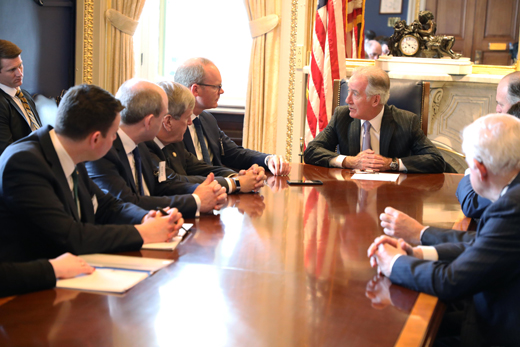
So what do you think of Trump as an individual?
I don’t know him well enough, but I think that in the age of theater, he’s an actor. I think that he probably enjoys this. I also think that this didn’t just happen – that we’ve been coursing through this for years. I think more entertainment has seeped into the political arena. It’s all instant opinion. There’s no deep breath, there’s no stepping back. There’s a lot of talking, and a lot less listening. And I think that the country has a lot of serious challenges in front of it. And I would like to think that some of this could calm for a period of time to get some of these big things done. Before you know it, by the time you get to the fall, we’re a year out from another presidential election. We’re exhausted from the last one, because it’s gone on.
Who do you like on the Democratic side?
I’m going to wait and see. I’ve got friends all over, with the job I’ve got. I think that we need to nominate the most electable Democrat. So that’s the bottom line.
The problem we have today is that we’ve now seen two elections where we’ve won the popular vote and lost the presidency. It is scary, and I think that part of this is that we need a mainstream Democrat.
So in terms of the tax returns, will you get them?
I don’t think that they’re going to be voluntarily turned over.
How far will all this go? Will it eventually go to the Supreme Court?
It could.
But even the Supreme Court surely can’t rule in his favor.
Well, I think that the law is very clear on this. It says, “Shall furnish, upon request,” and there is no sense, on my part, of malevolence here. There are eight successive presidents over forty years that have voluntarily released their forms. All the way back to Richard Nixon, they asked that their forms be reviewed. I don’t understand why, after the president said during the course of the campaign that he was going to voluntarily give up the forms, and then he said he was under audit. Now the IRS commissioner says, “It doesn’t make a difference; you can release the forms anyway.” But we’ve been very careful in preparing a court case. That’s why you don’t see me doing the bombast, and you don’t see me running to the cable shows. The House counsel has said to me, “You’ve got to be careful how you do this. You can’t do the shows, because you’re the petitioner in the court case, so you’re likely to be a witness.”
I was watching FOX News last night. The guy said you should be allowed to view them, but not take them away.
Well, that’s what actually happened with Richard Nixon and Joint Tax. You would have professionals review these. It’s not like you would have, you know, just the Ways and Means members, so I think that the answer, should we be successful, is the Joint Tax Committee, which is made up of attorneys, tax attorneys, accountants, and economists. I think that that would be a good sounding board.
What do you think he is hiding?
I don’t know what he’s hiding. I think that the idea that he wouldn’t submit to the same sort of test that the others have had is the challenge. The challenge is that I don’t even start with a malicious intent. My attitude is: let’s just take a look at the forms; we’re interested in seeing how the IRS conducts an audit. That’s the legal basis of the request. I think that that’s fair.
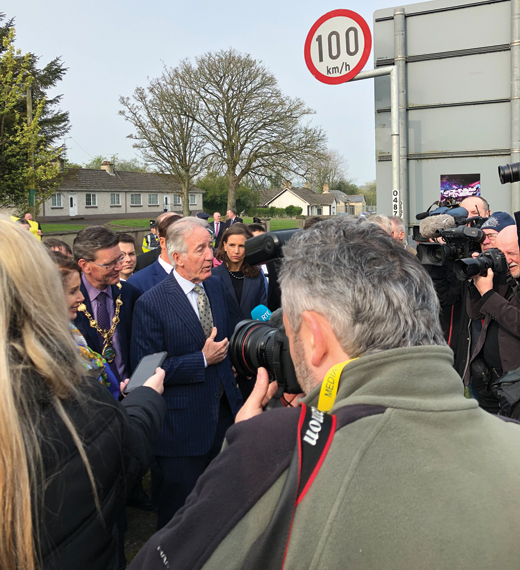
Do you think Trump will make it through his presidency without impeachment?
I think Speaker Pelosi would rather have an election than an impeachment. I think she’s right. You also have a presidential election now that’s, what, sixteen to seventeen months away? I was here during the Clinton impeachment and opinions shifted pretty vigorously on that. People forget, when Clinton left, two-thirds of the American people approved of the job that he had done. I was pretty impressed, because I was a big supporter. Be careful what you wish for. The other thing: be careful, only because you had in the Clinton case – you had the prosecutor, you had the press, you had the Republicans, and you had Clinton, and the people said,
“Of the four, we’ll take Clinton.” I mean, you’re known by your opponents sometimes. And the people that were involved in that at the time, they totally miscalculated, and I think [that’s why] Speaker Pelosi would rather have an election than an impeachment.
Hypothetical: President Warren calls on the phone and says, “I want you as ambassador to Ireland.”
As opposed to the Ways and Means chairmanship? I’ll stick with the Ways and Means chairmanship. Speaker Pelosi said to me when we were over there, “Did you ever think of running for one of those national offices?” Then she caught herself and she said, “Being chair of the Ways and Means Committee is better, isn’t it?” And I said, “Yes, it is.” ♦ Niall O’Dowd

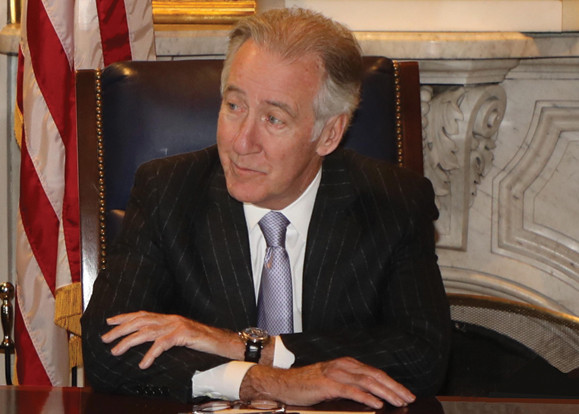
You cover a lot of ground, Nial, on multi-continents. This was interesting and sensible and Mr. Neal handles himself very well, like a boxer and you his sparring partner.
A long and interesting article. As usual, it’s also educational.